WordPress is the most popular website builder, but choosing it for your site is a big decision. If you’re not already familiar with the platform, you may be wondering whether it stands up to the competition.
Unlike Wix, Weebly, and Squarespace, WordPress is 100% free and open source. This draws in lots of users, but it’s important to understand what that means for your site.
While searching for a “WordPress review,” you might notice that finding an unbiased assessment is tough. Lots of articles focus on products that offer commissions, leaving you without a clear answer.
To make your choice easier, we’ve compiled a comprehensive review of WordPress, covering its pros and cons.
While WordPress has been our preferred platform for 16+ years, we know it’s not the right choice for everyone. So, this is a realistic WordPress review that we hope helps you decide if WordPress is the best fit for your website’s needs.
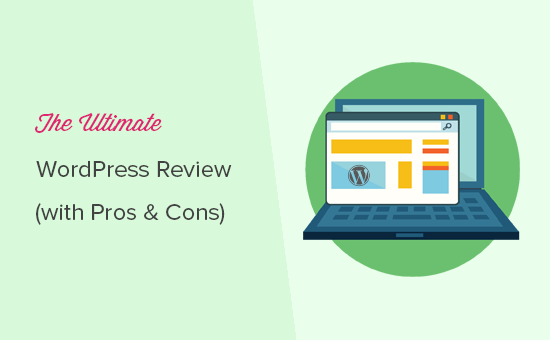
Because our WordPress review is extremely detailed, we have added a table of contents so you can jump between different sections:
- What is WordPress?
- What Kind of Websites Can You Make With WordPress?
- How Does WordPress Work?
- What Are the Pros and Cons of WordPress?
- Who Should Use WordPress? Is WordPress Right for You?
- How to Get Started with WordPress – The Right Way
- Mastering WordPress Skills
What Is WordPress?
WordPress is the world’s most popular site builder. It powers more than 43% of all websites on the Internet, which means it is used on millions of websites worldwide.
It’s important not to confuse the WordPress.org content management system (CMS) with the WordPress.com blog hosting service.
Our WordPress review is for the popular self-hosted WordPress software everyone loves and uses (not the WordPress.com hosting service). We recommend WordPress.org because it gives you full access to all WordPress features out of the box.
For more details, see our side-by-side comparison of WordPress.com vs. WordPress.org or take a look at our separate review of WordPress.com hosting service.
From now on, when we say WordPress, we are talking about the free WordPress.org software.
WordPress started as a simple blogging platform back in 2003. Since then, it has become a content management system and an application development framework. In simple words, you can easily build any type of website using WordPress.
To see how WordPress has changed over the years, please see our article on the evolution of the WordPress user interface and the complete history of WordPress.
WordPress is open-source software, which means it is free for everyone to download and install. Now, you may be thinking, why is WordPress free? What’s the catch?
It is free as in freedom. You can use it for any purpose, and no one can suspend your website due to censorship or terms of service violations. You also have the freedom to customize WordPress to your needs without any restrictions.
But like all websites, you will need to register a domain name and pay for web hosting.
We recommend using Bluehost because they are an officially recommended WordPress hosting provider. Plus, WPBeginner readers can get up to 70% OFF WordPress hosting and a FREE domain name.
Depending on your needs, you may need to purchase premium WordPress themes or extensions, which will incur additional costs. For a complete cost breakdown, see our article on the real cost of making a WordPress site.
That being said, now let’s take a look at what you can do with WordPress and how it works.
What Kind of Websites Can You Make With WordPress?
WordPress is extremely flexible, so it is a popular choice for website building. You can use it to build almost any kind of website imaginable!
You can use WordPress to:
- Start a blog
- Make a small business website
- Create an online store
- Build a membership site
- Sell online courses
- Run a marketplace
- Make a social media website
- And more
No matter what kind of website you want to build, there is probably an existing WordPress plugin (extension) for it. If you don’t find a plugin, you can easily hire a developer to create one.
Here’s a list of the most popular types of websites people are making with WordPress.
How Does WordPress Work?
Unlike other website builders, WordPress keeps design, content, and functionality separate from each other. This allows for data portability.
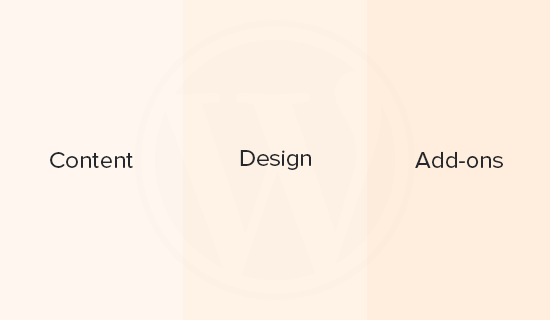
In other words, you can add content regardless of the design you are using, modify the design without changing your content, and add new features without affecting the other areas.
Let’s dig deeper into that.
1. Adding Content in WordPress
WordPress stores content in a database and media files like images in a separate folder. You will mainly be adding content to your website using the WordPress block editor.
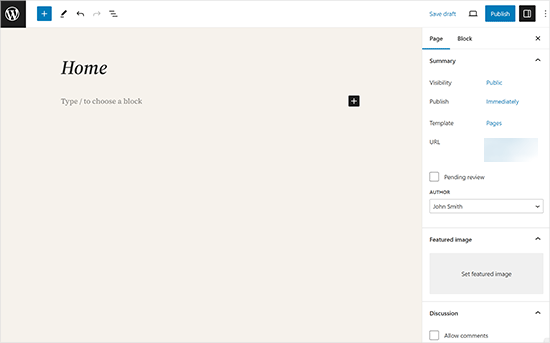
The block editor is very easy to use for beginners because it allows you to create content and style it using content blocks.
You can add blocks for each paragraph, images, videos, galleries, audio, lists, and more. There are blocks for all common content elements, and more can be added by WordPress plugins.
If you prefer, you can also use the Classic editor, but it lacks all the new features that the Block editor offers.
We have created an ultimate guide on how to master the WordPress content editor.
2. Managing Design and Appearance in WordPress
WordPress uses a powerful templating engine to manage the appearance of a website. This templating engine allows developers to create a set of templates called ‘Themes.’ There are thousands of pre-made WordPress themes available on the market.
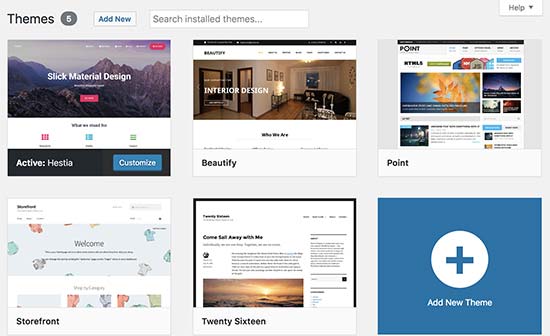
Each WordPress theme comes with a stylesheet and basic template files to display different sections of a typical WordPress website.
Depending on which theme you are using, it will come with its own settings, which you can use to customize the appearance of your website.
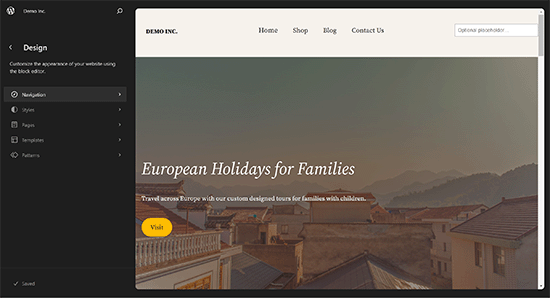
Many new themes use the full site editor, which uses the WordPress block editor to edit your theme’s design.
Other themes may use the Theme Customizer and offer different customization options.
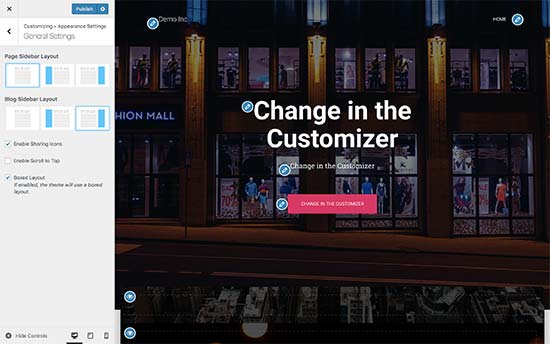
There are thousands of free and paid WordPress themes available that you can use to build a website. These themes allow you to use colors, layout combinations, and logos.
If you want a new theme, you can start with our guide on the best WordPress multi-purpose themes.
You can also hire someone to create a custom WordPress theme from scratch, but it would cost significantly more than using a free or premium WordPress theme.
Alternatively, you can use a drag-and-drop page builder like SeedProd, Thrive Theme Builder, Beaver Builder, or Divi to create a custom theme without hiring a developer.
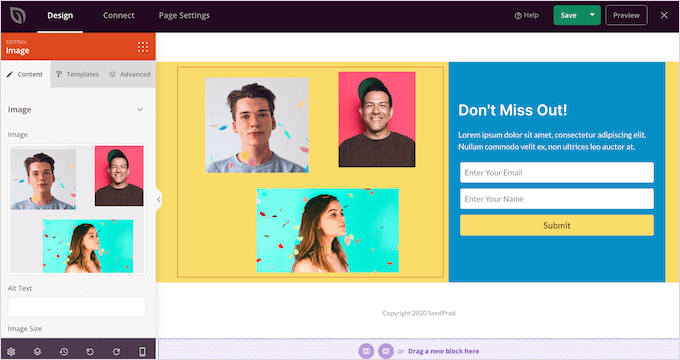
For more details, see this guide on creating a custom WordPress theme.
3. Extending WordPress with Add-ons
Due to its popularity, WordPress has become the platform for developers to write their own add-ons, which are called ‘Plugins.’
Plugins are like apps for your WordPress site. Like apps on your mobile phone, you can install WordPress plugins to add new features to your website.
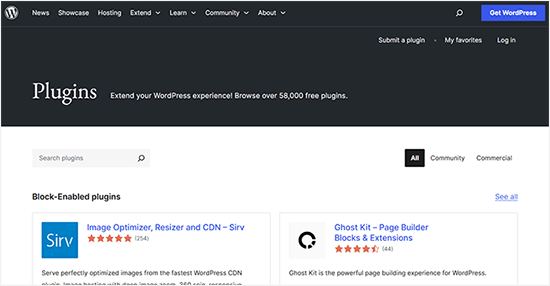
At the time of writing this article, there are more than 58,000 plugins available in the WordPress.org plugins directory alone. This means if you can think of a feature for your website, there is a very good chance that there is already a plugin.
Some WordPress plugins are simple and only add a specific feature, while others add a large set of features and functionalities.
There are even WordPress plugins like WooCommerce, the most popular eCommerce solution, which has its own ecosystem of WooCommerce plugins and themes. These plugins are like platforms built on top of the WordPress platform itself.
See our article on WordPress plugins and how they work to learn more.
Some of the best WordPress plugins that we recommend for every website are:
- WPForms Lite – Add contact forms, feedback forms, and more to your WordPress site.
- OptinMonster – The best lead generation plugin to get more email subscribers and sales from your website.
- MonsterInsights (Free) – Helps you track website activity and visitor stats from the WordPress dashboard using Google Analytics.
- WP Super Cache – Improves your website’s speed by adding cache.
- All in One SEO (AIOSEO) – Improve your WordPress SEO, improve your rankings, and get more traffic from Google.
- Duplicator – Free WordPress backup plugin to keep a copy of your site if something goes wrong.
- Smash Balloon – Social media feed plugins that help you connect Instagram, Facebook, Twitter, and YouTube to WordPress.
Plugins are often cited as the top reason why smart business owners choose WordPress over site builders like Wix and Weebly.
What Are the Pros and Cons of WordPress?
Like everything else in the world, WordPress has advantages and disadvantages, which you may want to consider before creating your website.
Pros of Using WordPress
The advantages of using WordPress to build your website deserve an entirely new article. We explained in detail in our article why you should use WordPress.
Here is a summary of the pros of using WordPress for your website.
- WordPress is free and gives you complete control of your website. You own and control all your website files and data. You are not tied to a web hosting company and can move your website anywhere.
- It gives you access to extensions, add-ons, and plugins to extend your website. This enormous access to professional applications allows you to make anything you want.
- You are in charge of your website, so you can keep it simple and only add new features as your website grows. You can make your website super fast and use all the SEO best practices to bring new users.
- It is super easy to customize, with thousands of website designs and templates. Each comes with different customization options, allowing you to create truly unique websites. Simply put, it makes website building easy.
- Due to its popularity, almost all popular third-party tools already have integrations available for WordPress. So, your email marketing software, lead generation tools, SEO tools, CRM software, payment gateways, and business phone services will all work with WordPress.
Cons of Using WordPress
This review wouldn’t be fair and balanced if it didn’t mention that WordPress is not perfect.
It has some disadvantages, we want you to consider them when choosing your platform.
- You are in charge of your website. This means you are also responsible for security, making backups, and installing updates. You can automate all these tasks, but they would still require your attention unless you are using one of these managed WordPress hosting companies.
- WordPress does not come with a built-in drag-and-drop website builder. It takes some time for most beginners to get familiar with it and learn the basics. However, you can use one of the popular drag-and-drop page builder plugins for WordPress.
- You do not need to learn coding to use WordPress. However, some basic knowledge of HTML and CSS will make things a lot easier. Most beginners acquire these basic skills by using WordPress.
Who Should Use WordPress? Is WordPress Right for You?
We love WordPress because it adapts to a user’s needs. It can be as easy and simple as you want it to be or as complex and sophisticated as you need it to be.
Since you are completely in charge and in full ownership, you can simplify things, control the cost, and efficiently run your website. We believe this control and ownership is important for small businesses and individuals.
Over the years, we have helped thousands of beginners learn WordPress and seen them quickly graduate to the intermediate or even advanced level.
Here is a simple checklist to see if WordPress is right for you:
- You want to make a professional business website without spending too much money.
- You can easily follow simple tutorials to learn the basics.
- You want to grow your business online with complete freedom.
- You want to make a blog, portfolio, or eCommerce store and use it to make money online.
If you agree with any of the above statements, WordPress is the perfect platform for building a website.
Who should not use WordPress?
While we sincerely believe that WordPress is the best platform for anyone who wants to make a website, we understand that some users may not need WordPress and would be fine with another solution.
Here is a simple checklist to see if you don’t need WordPress:
- You just want to run a blog and have no plans to make money or use any third-party services.
- You are fine with limited features as long as you never have to write code, make backups, or worry about updates.
- You just want a small website, and you are not worried about growing your business online or using the website to make more sales.
If you agree with these statements, you can use another platform. See our list of best blogging platforms and website builders to find a platform that may suit your needs.
We also have a quick comparison guide of WordPress vs. other popular platforms:
- WordPress vs. Wix
- WordPress vs. Squarespace
- WordPress vs. Weebly
- WordPress vs. Blogger
- WordPress vs. Google Sites
- WordPress.org vs. WordPress.com
- WooCommerce (WordPress) vs. Shopify
6. How to Get Started With WordPress – the Right Way
To start a self-hosted WordPress.org website, you will need to register a domain name and purchase website hosting.
We recommend using Bluehost. They are offering our readers a FREE domain name + free SSL certificate + 70% discount on WordPress hosting. This means you can start your website for as low as $2.99 per month.
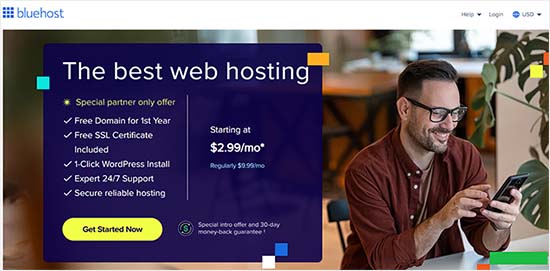
Why We Recommend Bluehost:
- Beginner-friendly comes with a 1-click WordPress install
- Affordable and offers a free domain and SSL
- Reliable performance with 24/7 customer support
For more details, see our complete Bluehost review.
Once you have purchased hosting, head over to our guide on how to make a website for step-by-step instructions.
Mastering WordPress Skills
While WordPress is easy to use, you may want to ask a question or need some help every now and again. The good news is that plenty of free resources help you with that.
WPBeginner itself is the largest free WordPress resource site for beginners. Here are our resources that you can use to learn WordPress (all are completely free).
- WPBeginner Blog – This is where we regularly publish new WordPress tutorials and how-to guides.
- WPBeginner Videos – These step-by-step videos will help you learn WordPress FAST.
- WPBeginner on YouTube – Need more video instructions? Subscribe to our YouTube channel with more than 1 million subscribers and 55 million views.
- WPBeginner Dictionary – Familiarize yourself with the WordPress lingo and improve your WordPress skills.
- WPBeginner Solution Center – Quickly find the best WordPress tools, curated by WPBeginner WordPress experts.
- WPBeginner Deals – Exclusive discounts on WordPress products and services for WPBeginner users.
If you have a WordPress-specific question, you can also contact us using our contact form.
We hope this WordPress review helped you understand the pros and cons of using WordPress. You may also want to see these actionable tips to bring more traffic to your new website and our guide on creating a free professional business email address for your website.
If you liked this article, then please subscribe to our YouTube Channel for WordPress video tutorials. You can also find us on Twitter and Facebook.





roger lubiens
We have used word press as an editor for our website for more than two years. Now they are restricting our band width. It varies week to week and it is disgusting their lack of support. Totally frustrated with Word Press
WPBeginner Support
Your bandwidth usage would be determined by your hosting provider and not WordPress itself. In that situation we would recommend going through our article below!
https://www.wpbeginner.com/beginners-guide/when-should-you-change-your-wordpress-web-hosting-top-7-key-indicators/
Admin
Jiří Vaněk
I have tried many content management systems such as Joomla, Drupal, phpBB, etc. I have also experimented with various ready-made solutions, and after years of working with websites, I have found that WordPress suits me best. It is simple, flexible, and has a large user base that is happy to help and provide advice. And that is precisely why I ended up sticking with WordPress and continue to use it to this day.
Dennis Muthomi
Your experience resonates with me. I also tried a few other paid platforms like SquareSpace before moving to WordPress.
It was very restrictive, especially when I wanted to add some custom CSS , I had to pay extra dollars for that.
I had to switch to WordPress which really opened things up for me in terms of flexibility and capabilities.
I was amazed by how Flexible it is, I’m fully on board with WordPress now too and have no plans on switching either.
Mrteesurez
Nice review.
Your word ‘ This is why if you search for “WordPress review”, you will hardly find anything useful because bloggers often tend to write reviews for products that they earn a referral commission from’
makes me laugh. That’s why we have WPbeginner and some other WP tutorials sites that offers free Tutorials and resources for WordPress. great WPbeginner !
Thanks for this honest review.
Peter Iriogbe
WordPress is popular and flexible, but its performance can be affected by factors like hosting and how well the site is set up.
Customized websites can give more control over security and performance, but building and maintaining them requires more work.
The choice between WordPress and a custom solution depends on what the website needs, the resources available, and how skilled the development team is. Both can work well depending on the situation.
THANKGOD JONATHAN
Wordpress is really the best.
However like anything else it has it’s pros and cons.
If you want to use Wordpress you need to know that you will need to take care of your site yourself: the security, hosting, maintenance, and any other thing.
WPBeginner Support
That can be true but there are also services that can help take over some of those processes for you.
Admin
Jiří Vaněk
However, on the other hand, this is a problem that affects all content management systems, not just WordPress. If you’re looking for a custom solution built on a CMS (as opposed to a ready-made built-in solution like WIX or Shopify), you will always have to take care of your website. It’s the same whether the site is on Joomla, Drupal, phpBB, or Magento. All content management systems are tools that need to be regularly updated and maintained to stay in good condition. So I wouldn’t consider this a disadvantage but rather a characteristic of every content management system that operates on a similar principle as WordPress, as mentioned above.
Okan Katan
Great! Thanks.